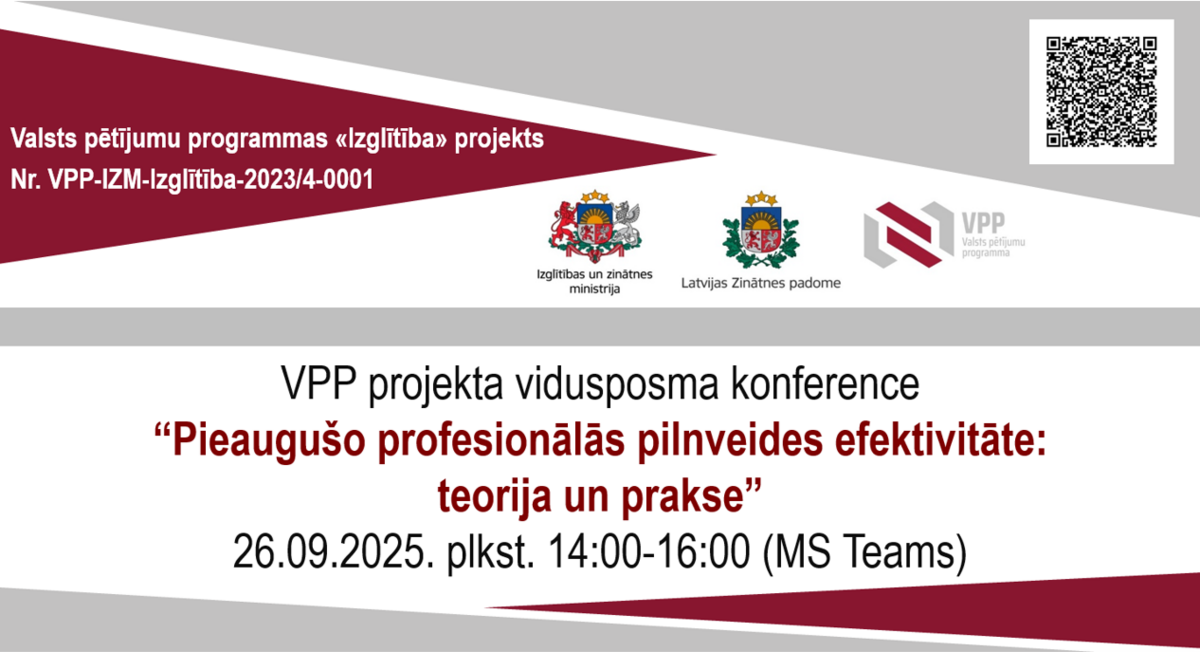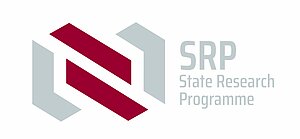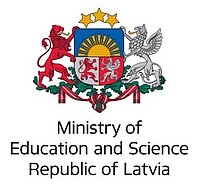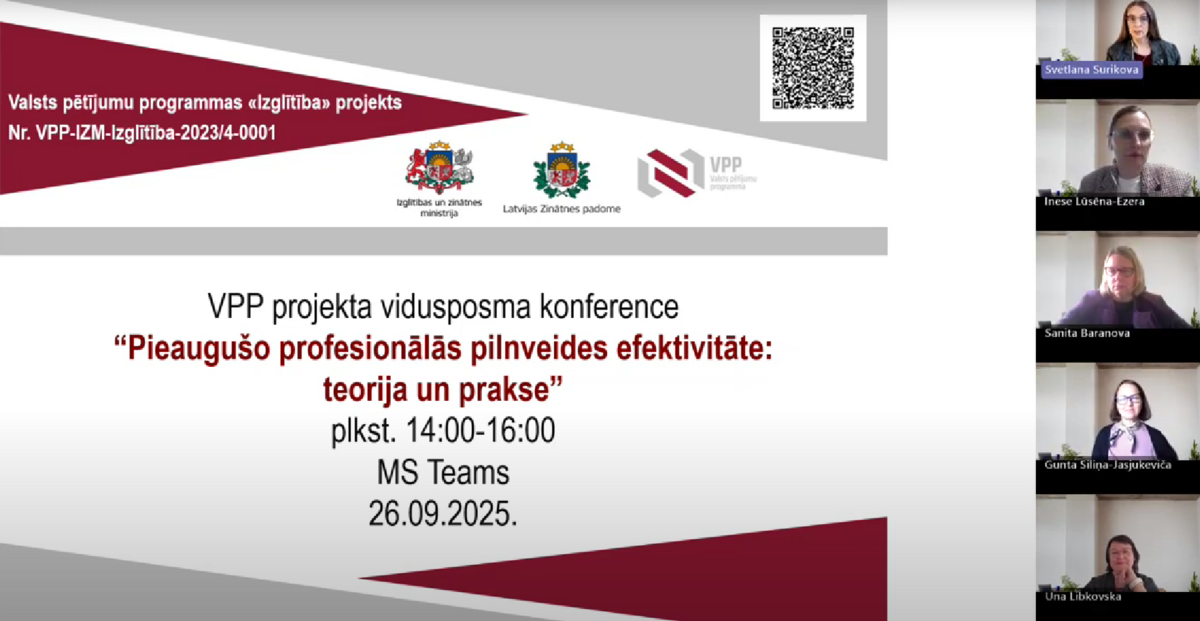
On 26 September 2025, as part of European Researchers’ Night, the mid-term conference of the State Research Programme (SRP) “Education” project “Elaboration of evidence-based solutions for effective professional competence development of adults and assessment of the transfer of its results into practice in Latvia” (project No. VPP-IZM-Izglītība-2023/4-0001) was held online. The research team from the University of Latvia, Ventspils University of Applied Sciences, and Riga Technical University Liepāja Academy presented the project’s interim results to all interested participants. In total, 115 participants attended the mid-term conference. The conference was opened by the SRP project’s scientific manager, Dr paed. Svetlana Surikova, followed by seven presentations. The event concluded with a discussion, during which participants had the opportunity to ask questions.
Dr paed. Sanita Baranova, a lead researcher of the SRP project, presented “Conceptualisation of Adult Professional Development and its Transfer into Practice”, summarising the findings of more than 60 systematic reviews and meta-analyses. These revealed three key aspects of effective professional development: planning and design of training, quality of implementation, and impact on job performance. She emphasised that transfer does not happen automatically – it must be planned and supported.
Dr paed. Dita Nīmante, a lead researcher of the SRP project, in her presentation “From Teachers’ Professional Development to its Transfer into Practice – Lessons from Good Practice”, summarised the results of examining 11 international good practice examples. She stressed that effective transfer is ensured by flexible and practical forms of learning, such as learning communities, action research, or microlearning models. The case of Singapore demonstrated that even short, digitalised modules can significantly enhance employee learning engagement and improve performance.
Dr paed. Svetlana Surikova, a lead researcher and scientific manager of the SRP project, in her presentation “Instruments for Measuring the Effectiveness of Training Transfer”, summarised the results of 68 case studies. She concluded that, when adapting existing or designing new tools to measure the effectiveness of adult professional competence transfer into practice, it is important to avoid excessive bureaucratisation, ensure objective and organic measurement, use self-assessment only as one component, and integrate measurement tools into professional practice rather than treating them as an additional burden.
Dr paed. Gunta Siliņa-Jasjukeviča, a lead researcher of the SRP project, presented “Adult Professional Development in Latvia: Perspectives of Focus-Group Participants”. In late 2024, 14 focus-group interviews and discussions were conducted with 129 representatives of various sectors (experts, adult education providers and learners). Analysis of the transcripts confirmed the need for an integrated, flexible, and collaboration-based adult education ecosystem.
Dr sc. administr. Inese Lūsēna-Ezera, a lead researcher of the SRP project, in her presentation “Main Barriers to Effective Adult Professional Development in Latvia”, summarised both previous research conducted in Latvia and the findings of focus-group analysis regarding the main categories of barriers. She concluded that improvements are needed in the professional development support system, particularly in resource provision and coordination across different levels and sectors, as well as in addressing accessibility of training in the regions.
Dr psych. Aleksandrs Koļesovs, a lead researcher of the SRP project, in his presentation “Motivation to Learn and Factors Facilitating Training Transfer from the Perspective of Latvian Employees”, analysed the results of an employee survey in Latvia. He emphasised that achievement orientation (drive for growth), relevant training content, and employer support are key elements in promoting training transfer.
The SRP project’s lead researcher Dr sc. administr. Una Libkovska and doctoral student Zane Zonberga, in their presentation “Impact and Return on Investment in Human Capital Development in the Latvian Economy”, underlined that investments in human capital have a direct and positive effect on productivity, innovation capacity, and GDP growth. They help build a competitive, knowledge- and skills-based economy that ensures long-term prosperity. Latvia has strong potential to significantly increase returns on investment in human capital, provided that three essential conditions are met: strategic long-term planning, coordinated institutional cooperation, and closer alignment between education and labour market needs.
The recording of the conference is available on the YouTube channel of the Faculty of Education Sciences and Psychology of the University of Latvia: https://youtu.be/aBXUE_FKFVs
The conference joint presentation is available HERE.



 CONFERENCE
CONFERENCE